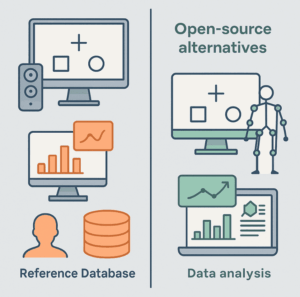QbTest and Open-Source Alternatives: Toward Accessible and Objective ADHD Assessment
 Introduction
Introduction
ADHD (Attention-Deficit/Hyperactivity Disorder) is one of the most studied neurodevelopmental conditions. Yet, its diagnosis is still largely based on clinical interviews and behavioral rating scales—tools that, while invaluable, rely heavily on subjective report. To reduce diagnostic uncertainty and improve treatment monitoring, objective measures have been developed.
The QbTest (Quantified Behavior Test) is one of the best known of these. It combines a computerized task of attention with real-time motion tracking to measure hyperactivity. Endorsed by NICE (UK) as an adjunctive tool and cleared by the FDA for clinical use, it has been adopted across several health systems.
But QbTest has limitations—cost, licensing, and the need for specialized hardware. This has motivated researchers and clinicians worldwide to explore open-source alternatives that can replicate elements of the QbTest model.
Components of the QbTest
The QbTest rests on three pillars:
-
Continuous Performance Test (CPT)
-
A computerized task, lasting 15–20 minutes.
-
Measures:
-
Omission errors → inattention.
-
Commission errors → impulsivity.
-
Reaction time (RT) & variability → sustained attention and cognitive control.
-
-
-
Infrared Motion Tracking
-
A reflective marker on the head is tracked with infrared cameras.
-
Captures total movement, micro-movements, and fidgeting—quantifying hyperactivity.
-
-
Normative Database & Reports
-
Results are compared against large age- and sex-stratified datasets.
-
Generates clinician- and patient-friendly graphs, useful for diagnosis and treatment monitoring.
-
Strengths of the QbTest
-
Objectivity: Reduces reliance on parent/teacher recall.
-
Improved diagnostic confidence: Especially in borderline cases.
-
Medication monitoring: Pre/post medication changes can be visualized.
-
Patient engagement: Visual feedback helps patients and families understand ADHD better.
Limitations of the QbTest
-
Not a standalone diagnostic tool: Always needs to be combined with history and rating scales.
-
Cost and accessibility: Proprietary licensing and equipment costs restrict availability in many countries.
-
False positives/negatives: Anxiety, sleep deprivation, or autism can influence performance.
-
Hardware dependency: Infrared cameras make scaling difficult in resource-limited settings.
Open-Source and Free Alternatives
While no single open-source tool fully replicates QbTest’s validated package, many can approximate its core components.
1. Continuous Performance Tests (Attention & Impulsivity)
-
PEBL (Psychology Experiment Building Language)
-
Free, open-source library with >100 tasks, including CPT, Stroop, Stop-Signal, Go/No-Go, and N-Back.
-
Runs on Windows, Mac, and Linux.
-
-
PsyToolkit
-
Web-based toolkit that runs experiments and surveys entirely online.
-
Includes prebuilt CPTs, Go/No-Go, Stroop tasks—easy for classroom or clinical research.
-
-
PsychoPy
-
Python-based, highly flexible software for building custom cognitive tasks.
-
Supports desktop and online (PsychoJS/Pavlovia) deployment.
-
Toolkits and integrations:
-
PsychoJS → run tasks in browsers.
-
OpenSesame compatibility → adapt existing tasks.
-
Neuropsydia (Python library) → integrates neuropsychological tasks with PsychoPy.
-
-
Particularly strong for labs that want custom ADHD paradigms (e.g., CPT + dual tasks).
-
-
PsychToolbox (MATLAB/Octave)
-
A classic in cognitive neuroscience. Extremely precise timing, but requires programming skills.
-
-
jsPsych (JavaScript)
-
Runs directly in browsers.
-
Useful for online ADHD studies, integrates well with PsychoPy/PsychoJS.
-
2. Motion Tracking (Hyperactivity)
-
OpenPose (Carnegie Mellon University)
-
Open-source software that tracks full-body posture and movement from webcam video.
-
Could replicate QbTest-style hyperactivity metrics without infrared hardware.
-
-
OpenFace
-
Tracks facial/head movements and gaze.
-
Can capture micro-restlessness or attentional disengagement.
-
-
Kinovea
-
Free motion analysis software (sports biomechanics).
-
Adaptable for ADHD motor activity tracking.
-
-
Webcam-based integrations
-
Researchers are already experimenting with PsychoPy + OpenPose pipelines to capture both task performance and hyperactivity.
-
3. Data Analysis & Visualization
-
Python (pandas, NumPy, matplotlib, scikit-learn) and R
-
Allow detailed analysis of reaction times, error patterns, movement metrics.
-
Machine learning can be applied for ADHD vs. non-ADHD classification research.
-
-
Community-driven datasets
-
Open-source platforms allow pooling of data across labs, potentially building normative datasets over time.
-
Clinical vs. Research Context
-
QbTest
-
Validated, FDA-cleared, norm-referenced.
-
Appropriate for clinical practice and regulatory use.
-
-
Open-source tools
-
Flexible, free, customizable.
-
Ideal for research, education, and innovation.
-
Not yet validated for clinical decision-making.
-
Future Directions
-
Digital phenotyping: Using smartphones, wearables, and webcams to passively monitor ADHD-related behaviors.
-
Hybrid models: Combining PsychoPy tasks + OpenPose tracking + cloud-based Pavlovia hosting could yield QbTest-like systems without hardware costs.
-
Open-source consortia: Collaboration across labs may eventually create normative data repositories, a step toward clinically usable, low-cost tools.
Conclusion
The QbTest remains the most validated computerized adjunct for ADHD diagnosis and treatment monitoring. It provides objective, norm-referenced measures of inattention, impulsivity, and hyperactivity, making it especially valuable in complex clinical cases.
At the same time, the rise of open-source ecosystems—PsychoPy, PEBL, PsyToolkit, jsPsych, PsychToolbox, OpenPose, OpenFace—offers cost-effective, customizable pathways for researchers and educators. These tools cannot yet replace QbTest in clinical practice, but they open up opportunities for innovation, accessibility, and the eventual democratization of ADHD assessment technology.
✦ About the Author
I’m Dr. Srinivas Rajkumar T, MD (AIIMS, New Delhi), Consultant Psychiatrist, practicing at Mind and Memory Clinic, Apollo Clinic, Velachery, Chennai (Opp. Phoenix Mall).
I specialize in ADHD and neurodevelopmental disorders, integrating pharmacotherapy, psychotherapy, neuromodulation (rTMS, tDCS, neurofeedback), and digital tools into care.
📞 +91 85951 55808